外研版九年级上Module 9 Great inventions Unit1课件(共47张ppt)
文档属性
| 名称 | 外研版九年级上Module 9 Great inventions Unit1课件(共47张ppt) |  | |
| 格式 | zip | ||
| 文件大小 | 4.1MB | ||
| 资源类型 | 教案 | ||
| 版本资源 | 外研版 | ||
| 科目 | 英语 | ||
| 更新时间 | 2016-11-30 12:16:21 | ||
图片预览

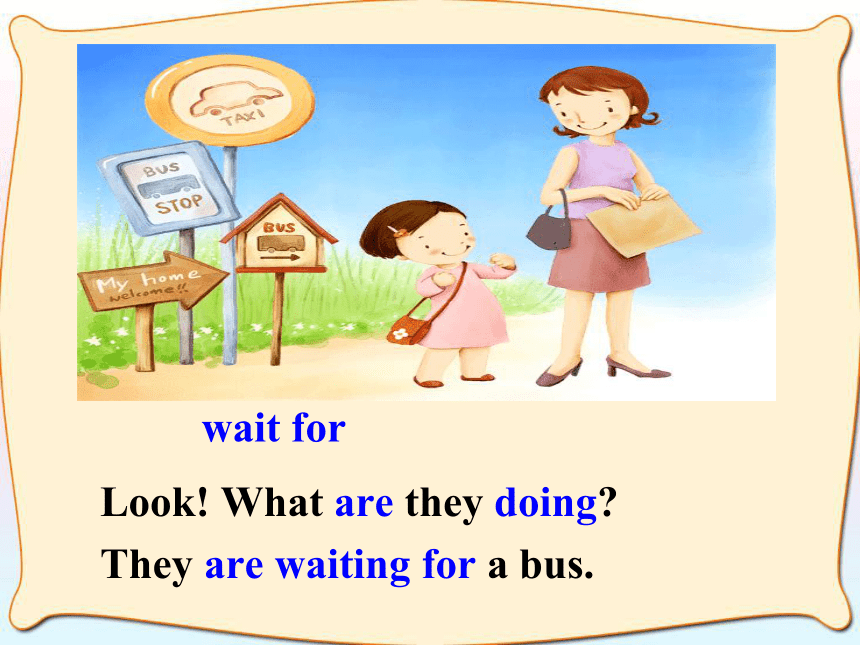
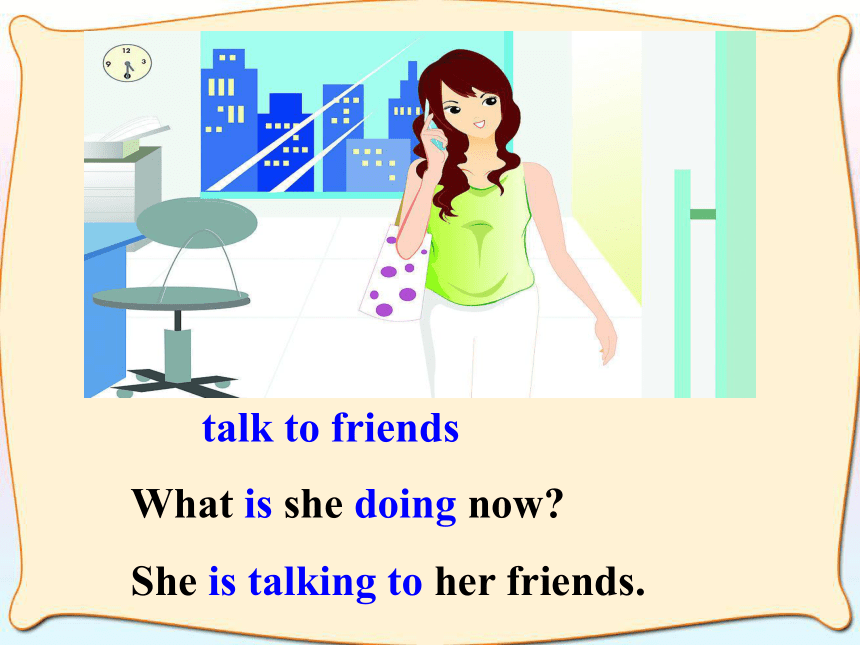
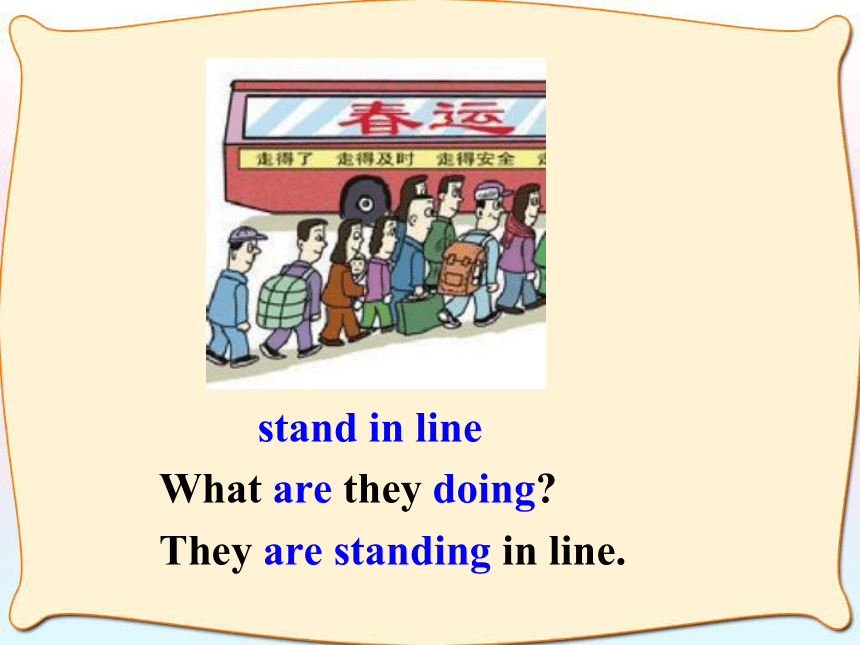
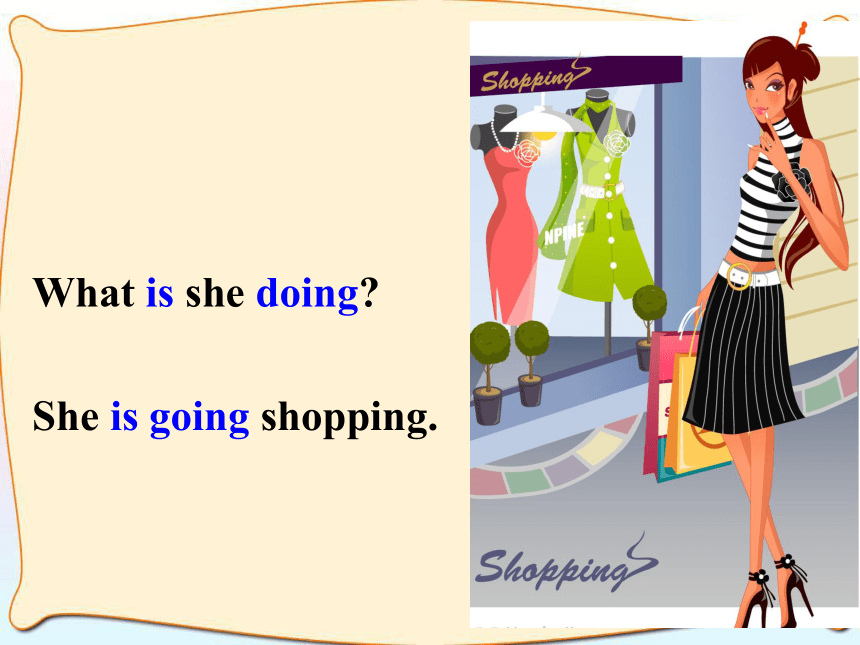
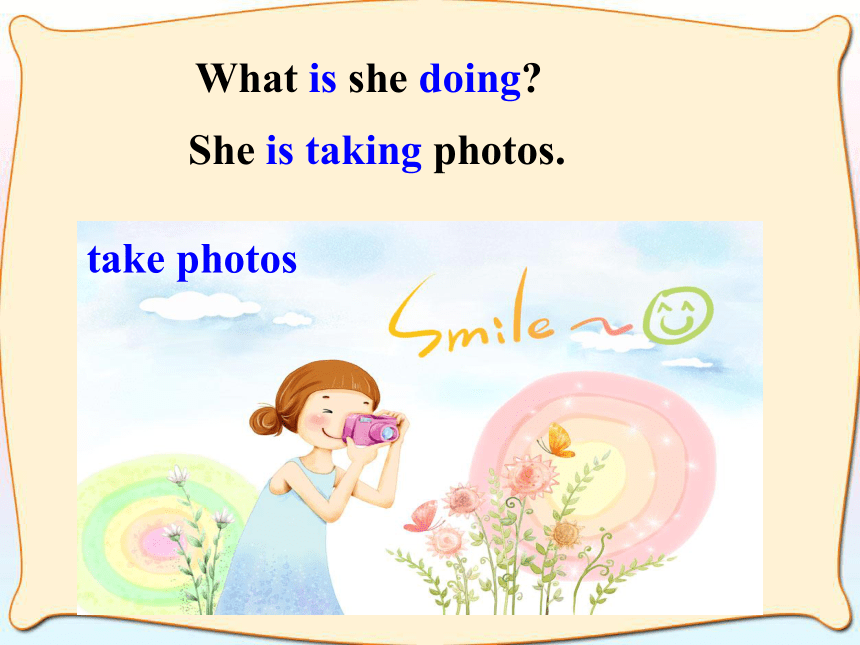
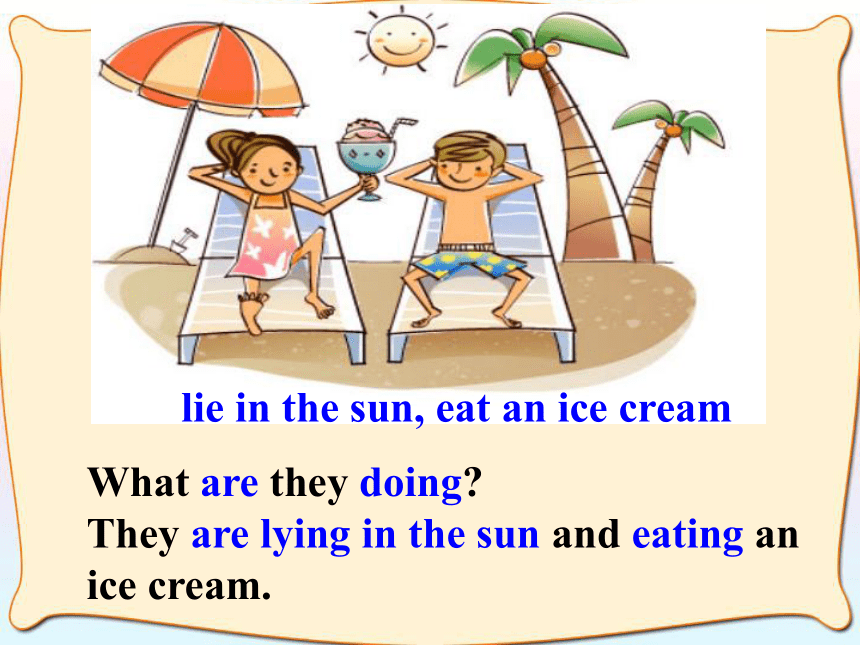
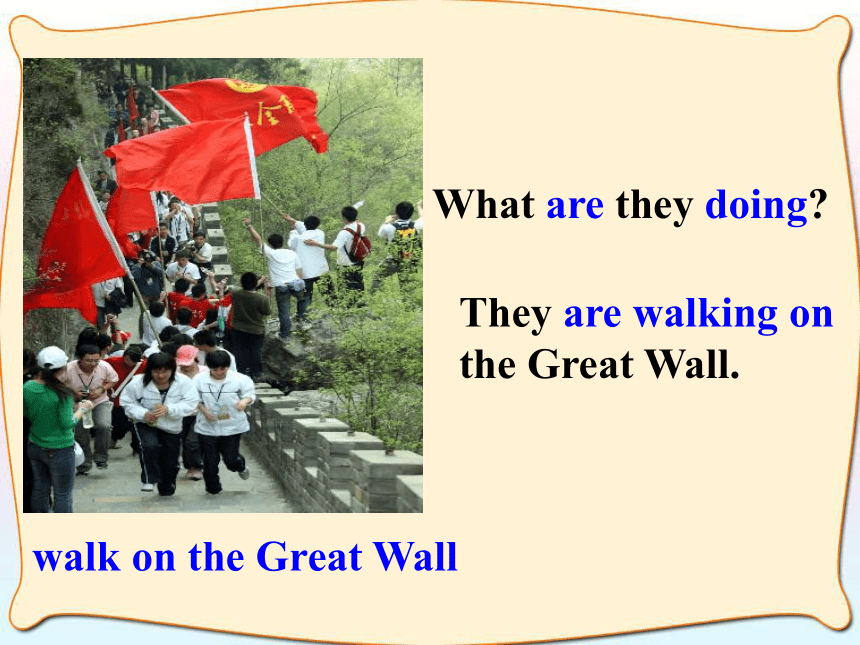

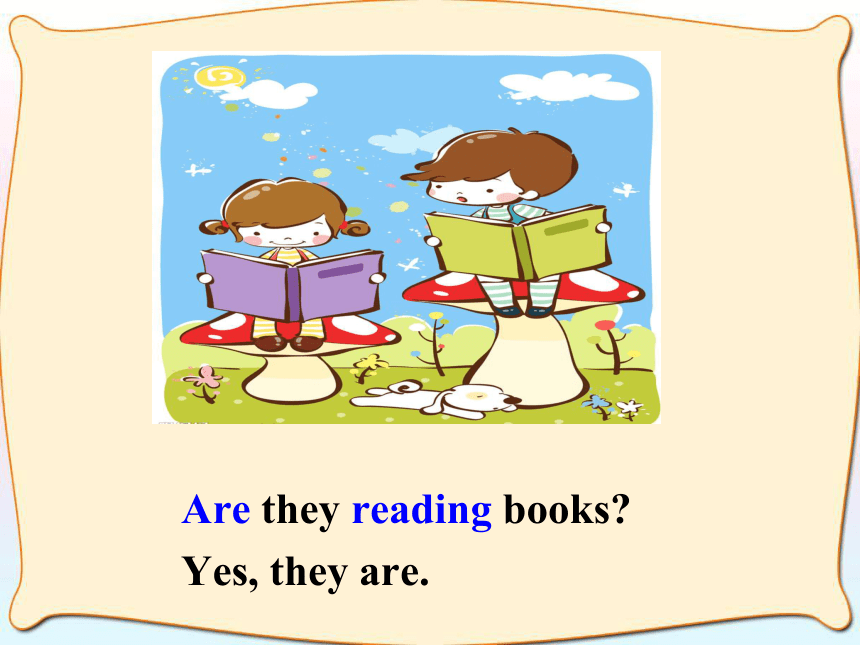
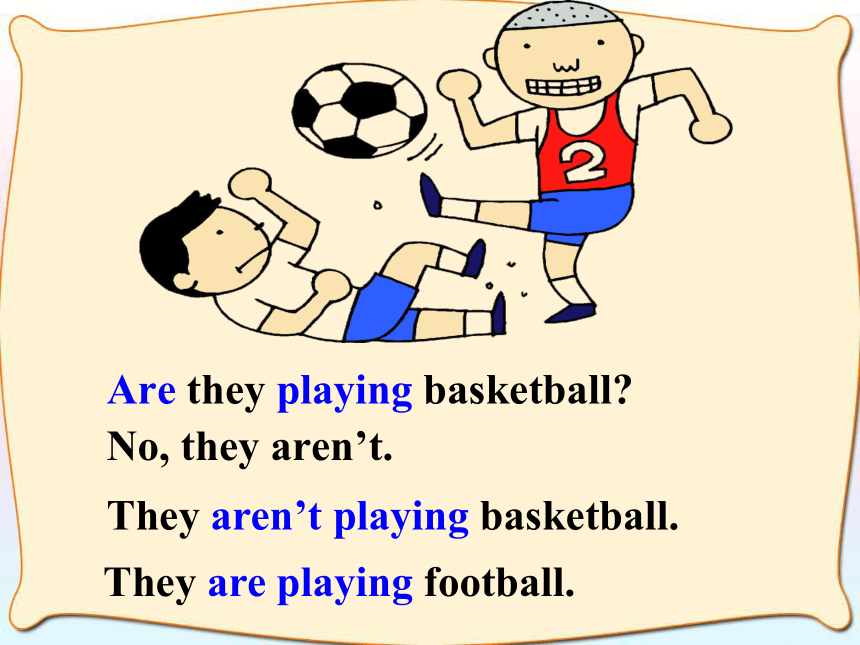
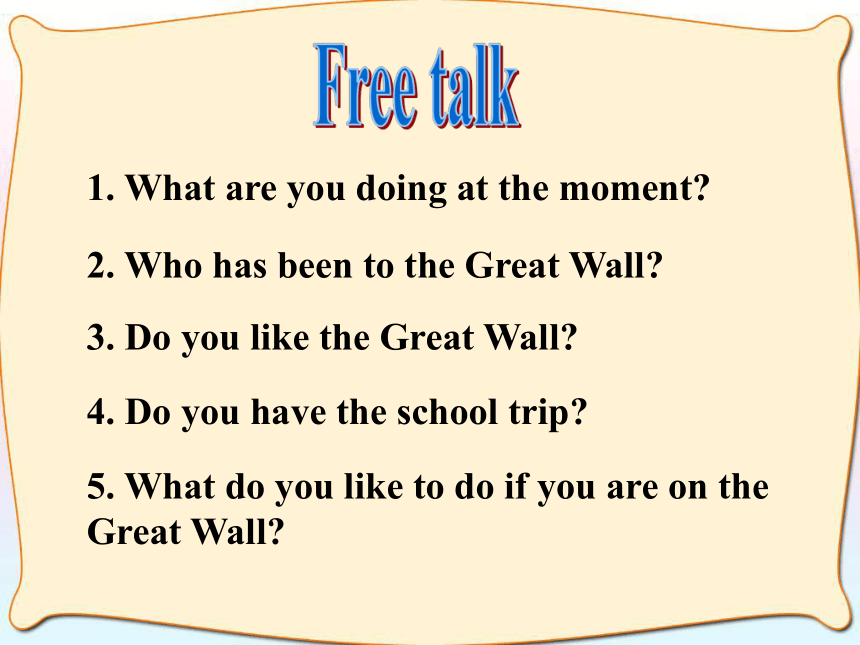
文档简介
(共47张PPT)
Look!
What
are
they
doing
They
are
waiting
for
a
bus.
wait
for
What
is
she
doing
now
She
is
talking
to
her
friends.
talk
to
friends
What
are
they
doing
They
are
standing
in
line.
stand
in
line
What
is
she
doing
She
is
going
shopping.
What
is
she
doing
She
is
taking
photos.
take
photos
lie
in
the
sun,
eat
an
ice
cream
What
are
they
doing
They
are
lying
in
the
sun
and
eating
an
ice
cream.
walk
on
the
Great
Wall
They
are
walking
on
the
Great
Wall.
What
are
they
doing
Is
she
driving
a
car
No,
she
isn’t.
She
isn’t
driving
a
car.
Are
they
reading
books
Yes,
they
are.
Are
they
playing
basketball
No,
they
aren’t.
They
are
playing
football.
They
aren’t
playing
basketball.
1.
What
are
you
doing
at
the
moment
3.
Do
you
like
the
Great
Wall
4.
Do
you
have
the
school
trip
2.
Who
has
been
to
the
Great
Wall
5.
What
do
you
like
to
do
if
you
are
on
the
Great
Wall
Work
in
pairs.
Look
at
the
pictures
and
talk
about
them.
buy
postcards
call
lie
in
the
sun
shop
stand
in
line
take
photos
wait
for
the
bus
walk
on
the
Great
Wall
Listen
and
number
the
pictures.
4
1
3
2
Listen
and
fill
in
the
blanks.
buy
_______
___________
take
a
________
lie
in
the
_____
eat
an
________
stand
in
____
wait
for
the
_____
bus
ice
cream
photo
postcards
and
presents
line
sun
Look
at
the
video
and
answer
the
questions.
Look
at
the
video
and
answer
the
questions.
1.
What
is
Betty
doing
2.
What
are
they
doing
She
is
calling
her
mother.
They
are
enjoying
the
school
trip.
She
is
standing
on
the
Great
Wall.
She
is
buying
some
presents
and
postcards.
3.
Where
is
Betty
4.
What
is
Lingling
doing
Listen
and
match
the
people
with
the
actions.
1.
Betty
2.
Lingling
3.
Daming
4.
Tony
5.
Lingling
and
Betty
6.
Wang
Hui
7.
The
children
a
He’s
lying
in
the
sun.
b
She’s
talking
to
her
mother.
c
They’re
enjoying
the
school
trip.
d
She’s
shopping
for
presents.
e
He’s
eating
an
ice
cream.
f
They’re
buying
postcards.
g
He’s
taking
photos.
Read
and
complete
the
table.
People
Things
he
/
she
is
doing
Betty
Tony
Wang
Hui
Lingling
Daming
She’s
talking
to
her
mother.
He
is
eating
a
delicious
ice
cream.
He
is
taking
lots
of
pictures.
She
is
buying
a
few
presents
and
postcards.
He
is
having
lunch
and
lying
in
the
sun.
1.
Betty
is
_______
on
the
Great
Wall
of
China
and
_______
to
her
mother.
2.
Tony
is
_______
a
delicious
ice
cream.
3.
Wang
Hui
is
_______
lots
of
photos.
4.
Lingling
____
______
a
few
presents
and
postcards.
5.
Daming
__
______
lunch
and
_____
in
the
sun.
Read
and
complete
the
sentences.
Then,
retell
the
conversation.
standing
talking
eating
taking
is
buying
is
having
lying
We’re
on
a
school
trip.
我们正在参加学校的郊游。
trip
“旅行,旅游,外出”,
尤指短途的旅行。如:
I’m
not
carrying
much
with
me
on
this
trip.
这次出去旅行我随身带的东西不多。
How
was
your
trip
你的旅行怎么样?
2.
And
Daming
is
eating
lunch
and
lying
in
the
sun.
大明正躺在阳光下吃午饭。
当我们用lie表示“躺在某处”时,须根据具体情况而定其后面的介词。如:
lie
in
the
sun
躺在阳光下
lie
on
the
bed
躺在床上
lie
on
the
floor
躺在地板上
lie
under
a
tree
躺在树下
3.
We’re
enjoying
the
school
trip
a
lot.
我们非常喜欢学校的这次郊游。
enjoy是动词,
意为“喜欢,
享受”,
其后可跟名词、代词或动词的-ing形式,
其意义和用法均与love和like相近。如:
—
Do
you
enjoy
/
like
the
novel
你喜欢这本小说吗?
—
Yes,
I
enjoy
/
like
it
a
lot.
是的,
非常喜欢。
He
enjoys
/
loves
traveling
very
much.
他非常喜欢旅游。
[拓展]
enjoy还常用于短语enjoy
oneself中,表示
“过得愉快,
感到快乐”,相当于have
a
good
time。如:
I
enjoy
myself
here.
我在这儿过得很快乐。
I
wish
everybody
can
enjoy
himself
/
herself
here.
希望每个朋友都能在这里玩的高兴。
like,love
和
enjoy
的区别
[拓展]
这三个动词都有“喜欢”的意思,但它们在用法上是有区别的:
1.
like
词义较弱,表示一般的“喜欢,爱好”,主要是对某事、某物、某项活动以及食物等有爱好或发生兴趣。like后接名词、代词、动名词或不定式作宾语。如:
Do
you
like
rice
你喜欢吃米饭吗?
All
of
us
like
playing
football.
我们都喜欢踢足球。
They
like
to
come
to
see
you.
他们喜欢来看你。
2.
love
意为“爱,喜爱”,在感彩上比like强烈,表示深深的(喜)爱。love
后也可接名词、代词、动名词或不定式作宾语。如:
We
love
our
country.
我们热爱我们的国家。
I
like
her
but
I
don’t
love
her.
我喜欢她,但并不爱她。
Children
love
watching
TV.
孩子们喜爱看电视。
3.
enjoy
意为“喜欢,欣赏,享受……的乐趣”。enjoy后可接名词、代词或动名词作宾语,一般不接动词不定式。如:
My
brother
enjoys
music.
我弟弟酷爱音乐。
He
enjoyed
his
dinner
yesterday.
昨天他晚饭吃得愉快。
Mr.
Read
enjoys
reading
story-books.
里德先生喜欢看故事书。
4.
like
和love均能与would
连用,表示委婉的请求或个人的想法、看法,意为“很想、想要、希望”,但enjoy不可这样用。如:
Would
you
like
/
love
to
go
with
me
你和我一起去好吗?
I’d
like
/
love
something
to
drink.
我想来点喝的东西。
enjoy
后可接反身代词,表示“玩得开心、过得愉快”,相当于have
a
good
time,
而
like
和
love
没有这种用法。如:
Did
you
enjoy
yourself
at
the
party
last
time
上次聚会你玩得开心吗
[Practice]
用like,
love
and
enjoy填空。
All
the
children
___________
watching
TV.
We
_________
talking
about
how
to
build
our
future!
The
little
boy
________
his
parents
very
much.
She
_________
her
work
because
she
loves
books.
like
/
enjoy
enjoy
loves
loves
Underline
the
correct
words.
The
children
are
on
a
school
trip
/
holiday
to
the
Great
Wall.
They’re
walking
on
it,
taking
photos
and
buying
a
few
/
a
lot
of
presents,
ice
creams
and
postcards
on
sale
/
line
at
the
shop.
They
are
enjoying
/
aren’t
enjoying
the
trip
a
lot.
Work
in
pairs
to
say
what
people
are
doing
in
the
conversation.
---
Betty
is
talking
to
her
mother.
---
…
Say
what
these
people
are
doing
in
the
pictures.
We
are
having
English.
He
/
She
is
sitting.
He
/
she
is
opening
the
door.
You
are
playing
football.
am
/
is
/
are
+
v-ing…
watching
TV
eating
dinner
doing
homework
cleaning
singing
running
playing
the
piano
swimming
calling
drinking
climbing
a
tree
having
a
good
time
1.
Li
Lei
______
doing
his
homework.
A.
am
B.
is
C.
are
2.
Are
you
_______
photos
A.
take
B.
taking
C.
taking
3.
Is
Miss
Gao
________
on
the
bed
A.
lie
B.
lies
C.
lying
B
B
C
Choose
the
right
answer.
4.
Lingling
and
Daming
_______
writing.
A.
are
B.
am
C.
is
5.
What
are
you
____
A.
do
B.
does
C.
doing
6.
There
are
___
animals
in
the
zoo.
A.
a
lot
B.
a
lot
of
C.
lot
of
7.
Tony
likes
tigers
____.
A.
a
lot
B.
a
lot
of
C.
lots
of
C
B
A
A
8.
The
two
boys___
on
the
playground.
A.
run
B.
runs
C.
are
running
9.
—
Who
are
they
____
—
Some
postcards.
A.
wait
B.
waiting
C.
waiting
for
10.
Don’t
read___
the
sun.
It’s
bad
for
your
eyes.
A.
in
B.
on
C.
under
C
C
A
1.The
students
are____
a
______
______(在学校郊游活动中).
2.We
are
enjoying
the
school
trip
____
____(非常,
很).
3.We____
________
(正站在)
on
_____
______
____
(长城)
and
________
___
(和
…说话)
him.
4._________(无论如何),
we
are
going
home.
Complete
these
sentences.
on
school
trip
a
lot
are
standing
talking
to
Anyway
the
Great
Wall
6.
Daming
___
______(正吃)
lunch
and____
____
_____
_____
(正躺在太阳下).
7.
The
girl
would
like
_______
_____
(购买)
a
new
hat.
8.There
are___
____(许多)
teachers
outside
the
building.
is
having
lying
to
buy
lots
of
in
the
sun
1.长城
2.与朋友们交谈
3.拍照
4.许多,大量
5.躺在阳光下
6.给我发送贺卡
Translate
the
following
phrases.
the
Great
Wall
talk
to
friends
take
photos
a
lot
of
/
lots
of
lie
in
the
sun
send
me
postcards
7.等公共汽车
8.正在出售
9.回到学校
10.正在出售的贺卡
11.在郊游
12.通过电子邮件
wait
for
the
bus
on
sale
go
back
to
school
postcards
on
sale
on
a
school
trip
by
email
Speaking
Work
in
pairs.
Say
what
people
are
doing
at
the
moment.
I’m
learning
English.
My
teacher
is
talking.
My
partner
is
listening
to
me.
My
mother
is
shopping.
We
...
Try
to
talk
about
what
people
are
doing
at
the
moment
in
your
family.
Try
to
use
the
present
continuous
tense.
Look!
What
are
they
doing
They
are
waiting
for
a
bus.
wait
for
What
is
she
doing
now
She
is
talking
to
her
friends.
talk
to
friends
What
are
they
doing
They
are
standing
in
line.
stand
in
line
What
is
she
doing
She
is
going
shopping.
What
is
she
doing
She
is
taking
photos.
take
photos
lie
in
the
sun,
eat
an
ice
cream
What
are
they
doing
They
are
lying
in
the
sun
and
eating
an
ice
cream.
walk
on
the
Great
Wall
They
are
walking
on
the
Great
Wall.
What
are
they
doing
Is
she
driving
a
car
No,
she
isn’t.
She
isn’t
driving
a
car.
Are
they
reading
books
Yes,
they
are.
Are
they
playing
basketball
No,
they
aren’t.
They
are
playing
football.
They
aren’t
playing
basketball.
1.
What
are
you
doing
at
the
moment
3.
Do
you
like
the
Great
Wall
4.
Do
you
have
the
school
trip
2.
Who
has
been
to
the
Great
Wall
5.
What
do
you
like
to
do
if
you
are
on
the
Great
Wall
Work
in
pairs.
Look
at
the
pictures
and
talk
about
them.
buy
postcards
call
lie
in
the
sun
shop
stand
in
line
take
photos
wait
for
the
bus
walk
on
the
Great
Wall
Listen
and
number
the
pictures.
4
1
3
2
Listen
and
fill
in
the
blanks.
buy
_______
___________
take
a
________
lie
in
the
_____
eat
an
________
stand
in
____
wait
for
the
_____
bus
ice
cream
photo
postcards
and
presents
line
sun
Look
at
the
video
and
answer
the
questions.
Look
at
the
video
and
answer
the
questions.
1.
What
is
Betty
doing
2.
What
are
they
doing
She
is
calling
her
mother.
They
are
enjoying
the
school
trip.
She
is
standing
on
the
Great
Wall.
She
is
buying
some
presents
and
postcards.
3.
Where
is
Betty
4.
What
is
Lingling
doing
Listen
and
match
the
people
with
the
actions.
1.
Betty
2.
Lingling
3.
Daming
4.
Tony
5.
Lingling
and
Betty
6.
Wang
Hui
7.
The
children
a
He’s
lying
in
the
sun.
b
She’s
talking
to
her
mother.
c
They’re
enjoying
the
school
trip.
d
She’s
shopping
for
presents.
e
He’s
eating
an
ice
cream.
f
They’re
buying
postcards.
g
He’s
taking
photos.
Read
and
complete
the
table.
People
Things
he
/
she
is
doing
Betty
Tony
Wang
Hui
Lingling
Daming
She’s
talking
to
her
mother.
He
is
eating
a
delicious
ice
cream.
He
is
taking
lots
of
pictures.
She
is
buying
a
few
presents
and
postcards.
He
is
having
lunch
and
lying
in
the
sun.
1.
Betty
is
_______
on
the
Great
Wall
of
China
and
_______
to
her
mother.
2.
Tony
is
_______
a
delicious
ice
cream.
3.
Wang
Hui
is
_______
lots
of
photos.
4.
Lingling
____
______
a
few
presents
and
postcards.
5.
Daming
__
______
lunch
and
_____
in
the
sun.
Read
and
complete
the
sentences.
Then,
retell
the
conversation.
standing
talking
eating
taking
is
buying
is
having
lying
We’re
on
a
school
trip.
我们正在参加学校的郊游。
trip
“旅行,旅游,外出”,
尤指短途的旅行。如:
I’m
not
carrying
much
with
me
on
this
trip.
这次出去旅行我随身带的东西不多。
How
was
your
trip
你的旅行怎么样?
2.
And
Daming
is
eating
lunch
and
lying
in
the
sun.
大明正躺在阳光下吃午饭。
当我们用lie表示“躺在某处”时,须根据具体情况而定其后面的介词。如:
lie
in
the
sun
躺在阳光下
lie
on
the
bed
躺在床上
lie
on
the
floor
躺在地板上
lie
under
a
tree
躺在树下
3.
We’re
enjoying
the
school
trip
a
lot.
我们非常喜欢学校的这次郊游。
enjoy是动词,
意为“喜欢,
享受”,
其后可跟名词、代词或动词的-ing形式,
其意义和用法均与love和like相近。如:
—
Do
you
enjoy
/
like
the
novel
你喜欢这本小说吗?
—
Yes,
I
enjoy
/
like
it
a
lot.
是的,
非常喜欢。
He
enjoys
/
loves
traveling
very
much.
他非常喜欢旅游。
[拓展]
enjoy还常用于短语enjoy
oneself中,表示
“过得愉快,
感到快乐”,相当于have
a
good
time。如:
I
enjoy
myself
here.
我在这儿过得很快乐。
I
wish
everybody
can
enjoy
himself
/
herself
here.
希望每个朋友都能在这里玩的高兴。
like,love
和
enjoy
的区别
[拓展]
这三个动词都有“喜欢”的意思,但它们在用法上是有区别的:
1.
like
词义较弱,表示一般的“喜欢,爱好”,主要是对某事、某物、某项活动以及食物等有爱好或发生兴趣。like后接名词、代词、动名词或不定式作宾语。如:
Do
you
like
rice
你喜欢吃米饭吗?
All
of
us
like
playing
football.
我们都喜欢踢足球。
They
like
to
come
to
see
you.
他们喜欢来看你。
2.
love
意为“爱,喜爱”,在感彩上比like强烈,表示深深的(喜)爱。love
后也可接名词、代词、动名词或不定式作宾语。如:
We
love
our
country.
我们热爱我们的国家。
I
like
her
but
I
don’t
love
her.
我喜欢她,但并不爱她。
Children
love
watching
TV.
孩子们喜爱看电视。
3.
enjoy
意为“喜欢,欣赏,享受……的乐趣”。enjoy后可接名词、代词或动名词作宾语,一般不接动词不定式。如:
My
brother
enjoys
music.
我弟弟酷爱音乐。
He
enjoyed
his
dinner
yesterday.
昨天他晚饭吃得愉快。
Mr.
Read
enjoys
reading
story-books.
里德先生喜欢看故事书。
4.
like
和love均能与would
连用,表示委婉的请求或个人的想法、看法,意为“很想、想要、希望”,但enjoy不可这样用。如:
Would
you
like
/
love
to
go
with
me
你和我一起去好吗?
I’d
like
/
love
something
to
drink.
我想来点喝的东西。
enjoy
后可接反身代词,表示“玩得开心、过得愉快”,相当于have
a
good
time,
而
like
和
love
没有这种用法。如:
Did
you
enjoy
yourself
at
the
party
last
time
上次聚会你玩得开心吗
[Practice]
用like,
love
and
enjoy填空。
All
the
children
___________
watching
TV.
We
_________
talking
about
how
to
build
our
future!
The
little
boy
________
his
parents
very
much.
She
_________
her
work
because
she
loves
books.
like
/
enjoy
enjoy
loves
loves
Underline
the
correct
words.
The
children
are
on
a
school
trip
/
holiday
to
the
Great
Wall.
They’re
walking
on
it,
taking
photos
and
buying
a
few
/
a
lot
of
presents,
ice
creams
and
postcards
on
sale
/
line
at
the
shop.
They
are
enjoying
/
aren’t
enjoying
the
trip
a
lot.
Work
in
pairs
to
say
what
people
are
doing
in
the
conversation.
---
Betty
is
talking
to
her
mother.
---
…
Say
what
these
people
are
doing
in
the
pictures.
We
are
having
English.
He
/
She
is
sitting.
He
/
she
is
opening
the
door.
You
are
playing
football.
am
/
is
/
are
+
v-ing…
watching
TV
eating
dinner
doing
homework
cleaning
singing
running
playing
the
piano
swimming
calling
drinking
climbing
a
tree
having
a
good
time
1.
Li
Lei
______
doing
his
homework.
A.
am
B.
is
C.
are
2.
Are
you
_______
photos
A.
take
B.
taking
C.
taking
3.
Is
Miss
Gao
________
on
the
bed
A.
lie
B.
lies
C.
lying
B
B
C
Choose
the
right
answer.
4.
Lingling
and
Daming
_______
writing.
A.
are
B.
am
C.
is
5.
What
are
you
____
A.
do
B.
does
C.
doing
6.
There
are
___
animals
in
the
zoo.
A.
a
lot
B.
a
lot
of
C.
lot
of
7.
Tony
likes
tigers
____.
A.
a
lot
B.
a
lot
of
C.
lots
of
C
B
A
A
8.
The
two
boys___
on
the
playground.
A.
run
B.
runs
C.
are
running
9.
—
Who
are
they
____
—
Some
postcards.
A.
wait
B.
waiting
C.
waiting
for
10.
Don’t
read___
the
sun.
It’s
bad
for
your
eyes.
A.
in
B.
on
C.
under
C
C
A
1.The
students
are____
a
______
______(在学校郊游活动中).
2.We
are
enjoying
the
school
trip
____
____(非常,
很).
3.We____
________
(正站在)
on
_____
______
____
(长城)
and
________
___
(和
…说话)
him.
4._________(无论如何),
we
are
going
home.
Complete
these
sentences.
on
school
trip
a
lot
are
standing
talking
to
Anyway
the
Great
Wall
6.
Daming
___
______(正吃)
lunch
and____
____
_____
_____
(正躺在太阳下).
7.
The
girl
would
like
_______
_____
(购买)
a
new
hat.
8.There
are___
____(许多)
teachers
outside
the
building.
is
having
lying
to
buy
lots
of
in
the
sun
1.长城
2.与朋友们交谈
3.拍照
4.许多,大量
5.躺在阳光下
6.给我发送贺卡
Translate
the
following
phrases.
the
Great
Wall
talk
to
friends
take
photos
a
lot
of
/
lots
of
lie
in
the
sun
send
me
postcards
7.等公共汽车
8.正在出售
9.回到学校
10.正在出售的贺卡
11.在郊游
12.通过电子邮件
wait
for
the
bus
on
sale
go
back
to
school
postcards
on
sale
on
a
school
trip
by
Speaking
Work
in
pairs.
Say
what
people
are
doing
at
the
moment.
I’m
learning
English.
My
teacher
is
talking.
My
partner
is
listening
to
me.
My
mother
is
shopping.
We
...
Try
to
talk
about
what
people
are
doing
at
the
moment
in
your
family.
Try
to
use
the
present
continuous
tense.
同课章节目录
- Module 1 Wonders of the world
- Unit 1 It's more than 2,000 years old.
- Unit 2 The Grand Canyon was not just big.
- Unit 3 Language in use
- Module 2 Public holidays
- Unit 1 My family always go somewhere interesting a
- Unit 2 We have celebrated the festival since the f
- Unit 3 Language in use
- Module 3 Heroes
- Unit 1 She trained hard,so she became a great play
- Unit 2There were few doctors, so he had to work ve
- Unit 3 Language in use
- Module 4 Home alone
- Unit 1 I can look after myself, although it won’t
- Unit 2 I became so bored with their orders that I
- Unit 3 Language in use
- Module 5 Museums
- Unit 1 Don't cross that rope!
- Unit 2 If you ever go to London, make sure you vis
- Unit 3 Language in use
- Module 6 Problems
- Unit 1 If I start after dinner, I'll finish it be
- Unit 2 If you tell him the truth now, you will sho
- Unit 3 Language in use
- Revision Module A
- Module 7 Great books
- Unit 1 We're still influenced by Confucius's idea
- Unit 2 It is still read and loved.
- Unit 3 Language in use
- Module 8 Sports life
- Unit 1 Daming wasn't chosen for the team last time
- Unit 2 He was invited to competitions around the w
- Unit 3 Language in use
- Module 9 Great inventions
- Unit 1 Will computers be used more than books in t
- Unit 2 Will books be replaced by the Internet?
- Unit 3 Language in use
- Module 10 Australia
- Unit 1 I have some photos that I took in Australia
- Unit 2 The game that they like most is Australian
- Unit 3 Language in use
- Module 11 Photos
- Unit 1 He's the boy who won the photo competition
- Unit 2 The photo which we liked best was taken by
- Unit 3 Language in use
- Module 12 Save our world
- Unit 1 If everyone starts to do something, the wor
- Unit 2 Repeat these three words daily: reduce, reu
- Unit 3 Language in use
- Revision Module B
